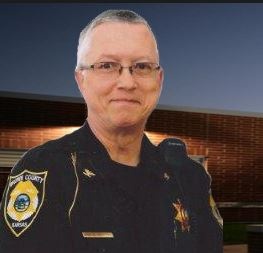(KNZA)--Brown County Sheriff John Merchant is reminding area residents about the importance of not leaving your young or infant children in your vehicle unattended — especially with temperatures on the rise.
One child death is too many when it comes to this totally preventable tragedy, he emphasized.
“A few years ago I attended a safety conference and spoke with a mother who had lost her infant child due to heatstroke,” he said. “She only went in to the store for a short amount of time and when she came out, her infant had perished due to the high temperatures that had escalated on a sunny day. She now regularly speaks at conferences so people can know first hand how a simple mistake has affected her life.”
Now, with the COVID-19 precautions there are more concerns about unattended small children and infants in vehicles.
“Parents feel that if they leave the vehicle running with the A/C on or the windows cracked open, that is acceptable,” Sheriff Merchant said. “I’m sorry to say that it is not---if the engine quit, temperature’s can soar in a matter of minutes in direct sun. Best case scenario is to make sure to have an older adult or family member supervise the children or make sure to leave them with a qualified care giver or family member.”
By statistic---A child dies from heatstroke about once every 10 days from being left unattended in a hot vehicle. Heatstroke is the number 1 leading cause of NON-CRASH vehicle fatalities for children under the age of 15. These types of child deaths are 100 percent preventable.
“Vehicle heatstroke occurs when a child is left in a hot vehicle, allowing for the child’s temperature to rise in a quick and deadly manner,” Sheriff Merchant said.
Merchant also warned about the Greenhouse Effect in vehicles, where the inside of a vehicle heats up very quickly. Even with the windows cracked, the temperature inside a car can reach 125 degrees in minutes. Cracking the windows does not help slow the heating process OR decrease the maximum temperature. Sheriff Merchant said 80 percent of the increase in temperature happens in the first 10 minutes, and children have died from heatstroke in cars in temps as low as 60 degrees.
“A child’s body absorbs more heat on a hot day than an adult — just because we do not feel the effects of the heat, it doesn’t mean the children are OK,” he said. “High body temperature can cause a child permanent injury or even death. 10 minutes is all the time it takes for a car to reach deadly temperatures.”
Merchant reminded to NEVER leave your child alone in a vehicle — even for short periods of time.
Some statistics:
54% of child death heatstroke cases, the child was “forgotten” by caregivers
27% of child heatstroke cases, the kids got in the vehicles on their own.
18% children were intentionally left in the vehicles by an adult.
1% unknown circumstances
The children that have died from vehicular heatstroke in the United States (1998-October 2016) have ranged in age from 5 days to 14 years. More than half of the deaths are children under 2 years of age. Below are the percentage of total (695) deaths (and the number of deaths).
SIGNS OF HEATSTROKE
Red, hot and moist
or dry skin
No sweating
A strong rapid pulse
or a slow weak pulse
Throbbing headache
Dizziness
Nausea
Confusion
Being grouchy or acting strangely
“We are asking the public’s assistance in helping to prevent these types of tragedies from happening,” Merchant said. “Be aware when in parking lots, garages, anywhere vehicles may be parked. Be on the lookout for any small children left unattended in vehicles. Notify law enforcement at once by calling 911, and stay with the vehicle until help arrives.”
Merchant issued a reminder that pets are also as susceptible to heat strokes in vehicles, just like children.
“With the higher summer temperatures on the way, we are also reminding everyone in addition to keeping an eye out for children at risk, the elderly and those with medical issues need proper care also,” he said. “If you have an elderly neighbor or relative, check on them often during days with high temperatures, make sure the have fans, a/c. etc that is needed to keep them comfortable. Regular fluid intake is a must, stay away from alcohol and caffine."
© Many Signals Communcations
MOST VIEWED STORIES
Hiawatha teen accused of child porn related crimes
Falls City child escapes serious injury after struck by vehicle
Two arrested after Holton search warrant
Breakins, suspect SUV, draw Highland investigation
Woman injured when car hits mobility scooter
Juvenile arrested in connection with threat leading to school lockdown
Local district judge vacancy filled
Additional charges filed against former police officer in Pawnee County
Man killed in Holt Co MO crash
Teen driver flees Atchison Co; arrested over LV Co line
One person injured in two-vehicle Jefferson Co crash
New Brown Co Commissioner sworn-in
EDGE updated status of former Falls City restaurant building
Atchison switches water treatment to assist affected suppliers
New fire station being built in Everest
Falls City Council approves contract for electric service upgrades
Budget cuts affect Register of Deeds in Atchison Co
CHCS unveils Holton campus master facility plan
LATEST STORIES
Brown Co considering changes to revitalization plan
Breakins, suspect SUV, draw Highland investigation
Richardson County Board approved purchases
Teen driver flees Atchison Co; arrested over LV Co line
Budget cuts affect Register of Deeds in Atchison Co
Hiawatha Trick-or-Treat nights
NSAA names area Believers and Achievers
Former State Chamber President and Pawnee City native dies
Additional charges filed against former police officer in Pawnee County

 Printer Friendly
Printer Friendly
 Email to a Friend
Email to a Friend






